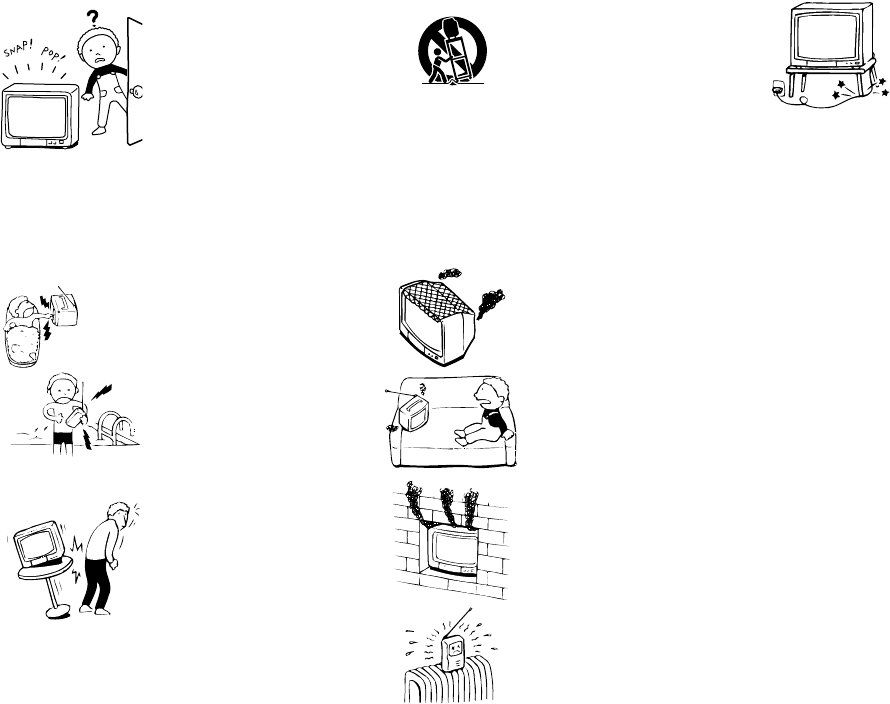
4
D:\JN\KP-53HS10\KP53HS10GB\407416311KP53HS10USA\02US-
KP53HS10USA\04TOCSAF.fm
masterpage:Left
Model name1[KP-53HS10] Model name2[KP-61HS10]
[4-074-163-11 (1)]
If a snapping or popping
sound from a projection TV
set is continuous or frequent
while the projection TV is
operating, unplug the
projection TV and consult
your dealer or service
technician. It is normal for
some projection TV sets to
make occasional snapping or popping sounds,
particularly when being turned on or off.
I
II
In
nn
ns
ss
st
tt
ta
aa
all
llll
lla
aa
at
tt
ti
ii
ion
onon
on
Water and Moisture
Do not use power-line
operated sets near water—
for example, near a bathtub,
washbowl, kitchen sink, or
laundry tub, in a wet
basement or near a
swimming pool, etc.
Accessories
Do not place the set on an
unstable cart, stand, table or
shelf. The set may fall,
causing serious injury to a
child or an adult, and serious
damage to the set. Use only a
cart or stand recommended
by the manufacturer for the
specific model of projection
TV.
An appliance and cart
combination should be
moved with care. Quick
stops, excessive force, and
uneven surfaces may cause
the appliance and cart
combination to overturn.
Ventilation
The slots and openings in the cabinet and in the
back or bottom are provided for necessary
ventilation. To ensure reliable operation of the set,
and to protect it from overheating, these slots and
openings must never be blocked or covered.
- Never cover the slots and
openings with a cloth or
other materials.
- Never block the slots and
openings by placing the set
on a bed, sofa, rug or other
similar surface.
- Never place the set in a
confined space, such as a
bookcase, or built-in cabinet
unless proper ventilation is
provided.
- Do not place the set near or
over a radiator or heat
register, or where it is
exposed to direct sunlight.
Power-Cord Protection
Do not allow anything to rest
on or roll over the power
cord, and do not place the set
where the power cord is
subject to wear or abuse.
Antennas
Outdoor Antenna Grounding
— If an
outdoor antenna is installed, follow the precautions
below.
An outdoor antenna system should not be located
in the vicinity of overhead power lines or other
electric light or power circuits, or where it can
come in contact with such power lines or circuits.
WHEN INSTALLING AN OUTDOOR
ANTENNA SYSTEM, EXTREME CARE
SHOULD BE TAKEN TO KEEP FROM
CONTACTING SUCH POWER LINES OR
CIRCUITS AS CONTACT WITH THEM IS
ALMOST INVARIABLY FATAL.
Be sure the antenna system is grounded so as to
provide some protection against voltage surges and
built-up static charges.
Section 810 of the National Electrical Code (NEC)
in USA and Section 54 of the Canadian Electrical
Code in Canada provides information with respect
to proper grounding of the mast and supporting
structure, grounding of the lead-in wire to an
antenna discharge unit, size of grounding
conductors, location of antenna discharge unit,
connection to grounding electrodes, and
requirements for the grounding electrode.


















